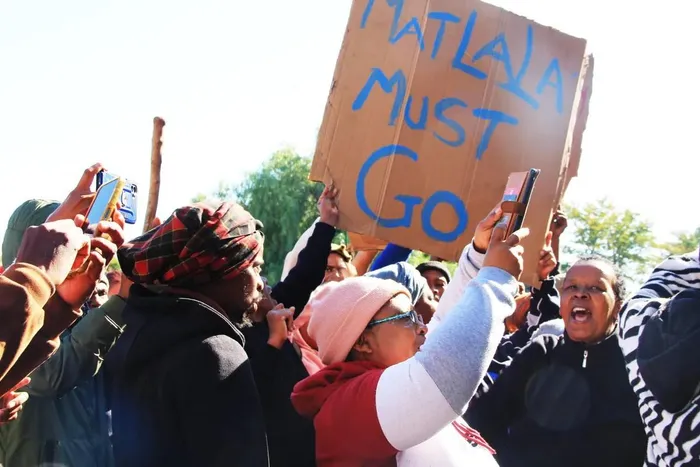No answers, no dialogue: Political fallout grows after Kimberley shutdown

Protesters called for the removal of the municipal manager during last week's shutdown march to the Premier's Office.
Image: Sandi Kwon Hoo / DFA
MORE than a week after the shutdown protests that disrupted parts of Kimberley, frustration continues to simmer — not only among residents but also among sidelined political voices who say they’ve been excluded from the conversation.
While the July 14 protest led by the Kimberley Action Group (KAG) drew attention to failing service delivery, unaffordable utility tariffs, and a demand for the removal of key municipal officials, the aftermath has yielded little visible progress. Behind closed doors, the ANC and Sol Plaatje Municipality have been locked in talks, yet the public remains largely in the dark.
Herbert Miller, a KAG representative, previously told the DFA that the ANC had been given seven days to respond to the movement’s list of demands, including the ousting of the Speaker and municipal manager. That deadline has now passed with no public update, intensifying community anxiety.
ActionSA in the Northern Cape has added its voice to the growing criticism, accusing both political leadership and civil society of failing to maintain meaningful engagement after the protest. In a statement released on Monday, the party questioned the lack of follow-up and accused some stakeholders of treating the shutdown as a media spectacle rather than a catalyst for sustained change.
“This is where democracy is quietly dying — not in the noise of protest, but in the absence of balanced dialogue and accountability when the cameras stop rolling,” said ActionSA provincial leader Andrew Louw.
The party also raised concerns about being excluded from pre- and post-shutdown discussions, despite claiming to represent many of the same affected communities. While KAG received considerable coverage in the lead-up to and during the protest, ActionSA says that its outreach efforts — including a community poll and youth engagement on social media — were ignored by organisers and media alike.
According to ActionSA, attempts to engage the KAG leadership prior to the protest were rebuffed with a firm “We don’t work with politicians.” The party called this stance “short-sighted” and “dangerous”, arguing that isolating political actors undercuts efforts to build long-term solutions.
“To the KAG leadership, I say this: disagreement is allowed. But disengagement is not a strategy. Refusing to collaborate with political leadership simply because we wear different colours doesn't serve the people — it isolates them further,” said Louw.
ActionSA’s criticism was not limited to KAG. The media also came under fire for what the party described as “selective platforms and selective outrage”, alleging that one-sided coverage has contributed to a fractured civic dialogue in Kimberley.
As the political blame game unfolds, the real issue remains unresolved: Kimberley residents are still grappling with poor services, high living costs, and a growing sense of abandonment. The city’s attention has been pulled toward Ward 1, where a by-election is under way, but residents in other areas say their needs are being ignored.
ActionSA’s statement concluded with a call for co-operation between civil society and political leadership: “Kimberley does not need another shutdown. It needs a step-up — a coming together of responsible voices… to work through real plans for real change.”
Whether that unity can be achieved remains uncertain. But as the community waits for answers and tensions threaten to reignite, the window for meaningful resolution appears to be narrowing.
Update:
Boyce Makodi from the Kimberley Action Group (KAG) said on Tuesday that engagements with the Premier’s Office and the ANC were still under way, with more follow-up meetings planned over the next two weeks.
He emphasised that the group would not back down from its demands for the immediate removal of Speaker Dipuo Peters and Sol Plaatje municipal manager Thapelo Matlala.